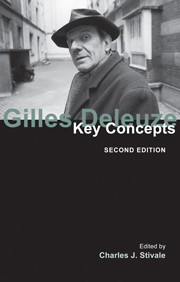14 - From affection to soul
from Part III - FOLDS
Summary
To assume that there was a power of being affected which defined the power of being affected of the whole universe is quite possible…
(Deleuze 1997c, emphasis added)What follows is a story of affect as a set or series of encounters: affectionate encounters with enemies and allies, often proximate, sometimes more distant, and quite regularly both at the same time. Although this essay moves, in large part, by proper names (Guattari, Deleuze, Lacan, Lyotard, Foucault), it is simultaneously a story of affect's different modes of existence. Each encounter shifts slightly in its emphasis, while progressively navigating through the chief forms – and un-forms – of affect. It should be remembered that these affectional modes (as points, lines, vaporous atmospheres and planes) are, by their nature, perpetually tangled up in one another. However, it always takes far more than two or three to tangle, even if we begin with and between (seemingly) two: Guattari and Deleuze.
Brief prelude: affect as passion, or, when Felix and Gilles met
…passion dissolve[s] persons not into something undifferentiated but into a field of various persisting and mutually interdependent intensities… Love's a state of, and a relation between, persons, subjects. But passion is a subpersonal event that may last as long as a lifetime… It is very difficult to express, to convey – a new distinction between affective states.
(N: 116)- Type
- Chapter
- Information
- Gilles DeleuzeKey Concepts, pp. 181 - 191Publisher: Acumen PublishingPrint publication year: 2011

